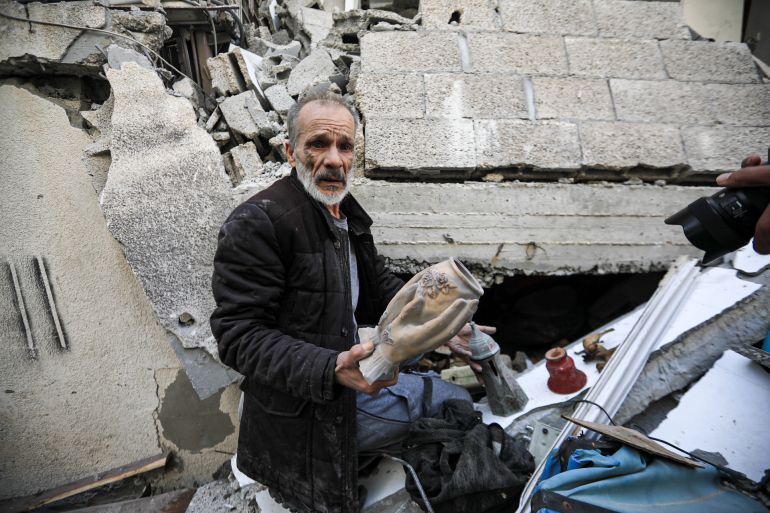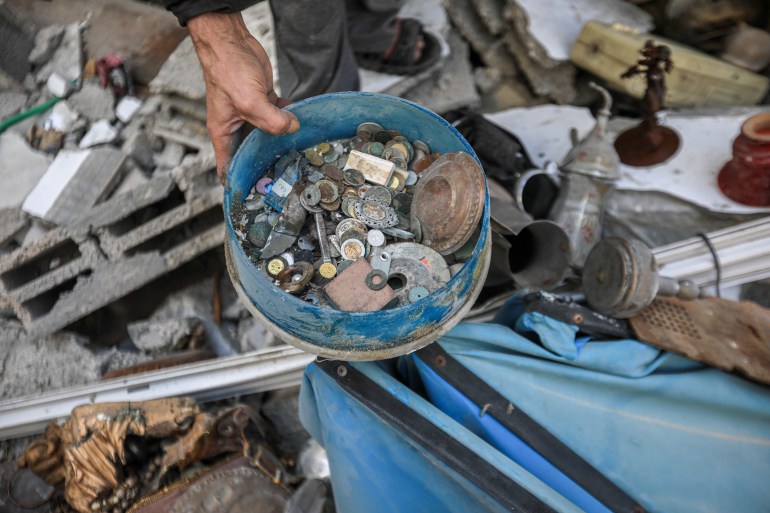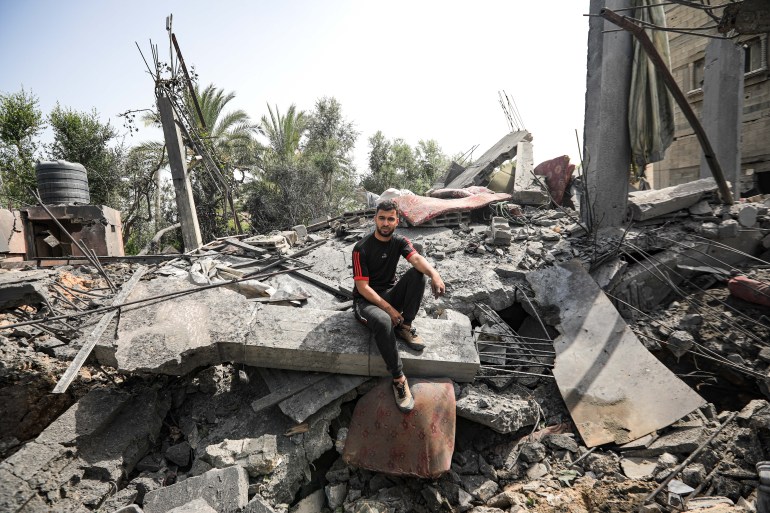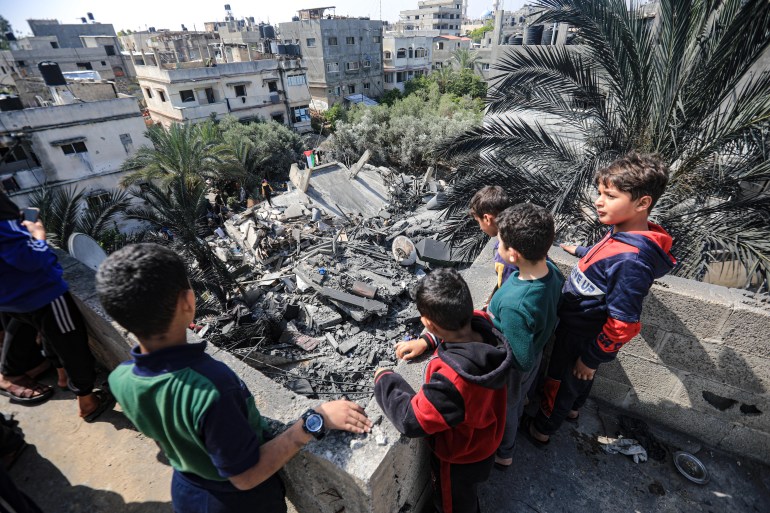Israel bombed this Gaza house, turning antique collection to dust
Gaza man visits his home destroyed in Israeli bombing in the hope of retrieving his antique collection dating back hundreds of years.

Gaza City – Since his house was destroyed in an Israeli bombing on May 12, Hazem Mohanna still comes every day searching through the rubble to find his treasured antique collection.
The 62-year-old spent 40 years of his life collecting antique silver coins, precious stones and pieces related to the Palestinian heritage as part of his hobby. His four-storey house in the al-Sahaba neighbourhood east of Gaza City, Mohanna says, has turned into “a unique archaeological museum”.
Keep reading
list of 4 itemsIs a ‘new Nakba’ happening in Gaza?
‘The war we know is better’: Palestinians leave Sudan for Gaza
Najwa, a Palestinian woman paralysed in Israel’s assault on Gaza
On May 12, the third day of the latest Israeli military assault on Gaza, Mohanna received a call from Israeli intelligence while he was sitting with his family. “They gave me only five minutes to vacate my house,” he told Al Jazeera.
“I was so shocked. My wife and my married children and their children immediately ran out of the four-story building,” the father of four said.
“I was able to save myself and my family, but I could not save my belongings that I spent my life collecting and taking care of,” he said with a visibly sad face.
Israel has bombed hundreds of houses in Gaza in the past several assaults, giving residents anywhere from a few hours to just minutes of notice to vacate – and attracting criticism from human rights organisations.
Israel bombed an 11-storey building housing Al Jazeera’s news office in May 2021 after giving notice of barely one hour. About 250 Palestinians were killed in 11 days of relentless Israeli bombings.

“My antique collection meant a lot to me. There are many precious pieces that date back hundreds of years,” said Mohanna, a retired Palestinian Authority security officer.
“There are identification documents from many countries, pieces related to the Palestinian heritage, such as embroidered clothes, baggage, and copper artifacts,” he said.
“There are things and memories that cannot be compensated for any amount of money, due to our attachment to them. I wish my children would inherit my small archaeological museum, but the Israeli occupation pursues everything, even our memories and hobbies.”
The antique collector still cannot find a reason or a justification for the bombing of his house. “We’re all mere civilians,” said Mohanna, who now lives in a small two-bedroom rented apartment with his 16-member family, including his four married children.
He is worried about the reconstruction of his house along with hundreds of others. At least 20 buildings, with a total of 56 housing units, were completely destroyed and 940 housing units were damaged during the Israeli military escalation, according to the Ministry of Public Works.
“So far, nobody contacted me for compensation or even to pay his apartment rent,” Mohanna said. “There are houses that were destroyed in the previous Israeli offensives that have not been rebuilt yet, so when will our turn come?”
‘Enough of wars’
Sabah Abu Khater, 60, said the latest Israeli military escalation took joy away from her son, who was a month and a half away from getting married.
On the afternoon of May 11, the family of 10 was watching the news in their home in Beit Hanoun in the northern Gaza Strip when they received a phone call ordering them to evacuate their house as it was going to be bombed.
Israel has justified bombing civilian homes by saying they are used by armed groups – a claim refuted by Palestinians.

“I heard the neighbours shouting, ‘Get out of the house! It will be bombed now!’,” Khater said.
“We all left the house immediately. My children, their wives, and my grandchildren. We rushed to the street with only the clothes we were wearing,” she said while searching for belongings in the rubble of her two-storey house.
“We arranged my son’s bride price and we were preparing to complete the engagement after the situation would calm down, but now we are back to square one,” Khater said, referring to the amount a groom has to pay a bride at the time of their wedding as per Islamic laws.
“I feel sad and heartbroken for my son, who spent a lot of money and effort to collect his dowry and build his house,” she said.
“People here in Gaza have enough of wars and misfortunes.”
Khater’s 26-year-old son, Bilal Abu Khater, sitting frustrated on the rubble of his family house, recounted how he painstakingly collected his bride’s dowry and prepared a modest house for marriage.
“I was forced to work overtime for a low wage, not exceeding 20 shekels per day, and maybe less, which is equivalent to four dollars, in addition to the assistance provided to me by my uncles and relatives abroad,” he said.

“Today I have been forced to work more to help build a new house as well as bear the expenses of my family, who have all become homeless,” said Bilal Abu Khater.
“Young people in the Gaza Strip suffer from difficult living conditions due to the lack of job opportunities and the ongoing blockade,” he said, referring to the land, air and sea blockade of the Palestinian enclave imposed by Israel since 2007.
“Wars,” Bilal Abu Khater says, “come to make matters worse.”
“It took years to build our house, and now we will take long to rebuild,” he said in a broken tone before thanking God that his family is safe. “Money compensates. The important thing is that none of us was hurt.”
Israeli warplanes targeted homes and apartments throughout the Gaza Strip as part of an Israeli military assault that began on May 9. It said the bombing was directed towards the Islamic Jihad movement, but Palestinians and rights organisations said mostly civilians were killed in the five-day assault. Palestinian factions launched rockets into Israel, killing one Israeli person.
By the time an Egypt-mediated ceasefire came into effect on May 12, at least 33 Palestinians, including six children, were killed and 190 wounded, with an economic loss estimated to be $5m.
